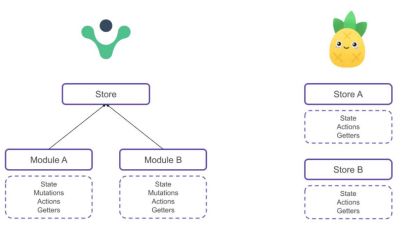vue全家桶之状态管理Pinia
一、Pinia和Vuex的对比
1.什么是Pinia呢?
Pinia(发音为/piːnjʌ/,如英语中的“peenya”)是最接近piña(西班牙语中的菠萝)的词;
-
Pinia开始于大概2019年,最初是作为一个实验
为Vue重新设计状态管理,让它用起来像组合式API(Composition API)。 -
从那时到现在,最初的设计原则依然是相同的,并且目前同时兼容Vue2、Vue3,也并不要求你使用Composition API;
-
Pinia本质上依然是一个
状态管理的库,用于跨组件、页面进行状态共享(这点和Vuex、Redux一样);
2.Pinia和Vuex的区别
那么我们不是已经有Vuex了吗?为什么还要用Pinia呢?
- Pinia 最初是为了探索 Vuex 的下一次迭代会是什么样子,结合了 Vuex 5 核心团队讨论中的许多想法;
- 最终,团队意识到Pinia已经实现了Vuex5中大部分内容,所以最终决定
用Pinia来替代Vuex; - 与 Vuex 相比,Pinia 提供了一个更简单的 API,具有更少的仪式,提供了 Composition-API 风格的 API;
- 最重要的是,在与
TypeScript一起使用时具有可靠的类型推断支持;
和Vuex相比,Pinia有很多的优势:
- 比如mutations 不再存在:
- 他们经常被认为是非常冗长;
- 他们最初带来了 devtools 集成,但这不再是问题;
- 更友好的TypeScript支持,Vuex之前对TS的支持很不友好;
- 不再有modules的嵌套结构:
- 你可以灵活使用每一个store,它们是通过
扁平化的方式来相互使用的;
- 你可以灵活使用每一个store,它们是通过
- 也不再有
命名空间的概念,不需要记住它们的复杂关系;
二、创建Pinia的Store
1.如何使用Pinia?
使用Pinia之前,我们需要先对其进行安装:
yarn add pinia
# or with npm
npm install pinia
创建一个pinia并且将其传递给应用程序:
import { createPinia } from 'pinia'
const pinia = createPinia()
export default pinia
import pinia from './store'
createApp(App).use(pinia).mount('#app')
2.认识Store
什么是Store?
- 一个 Store (如 Pinia)是一个实体,它会持续绑定到你组件树的状态和业务逻辑,也就是保存了全局的状态;
- 它有点像始终存在,并且每个人都可以读取和写入的组件;
- 你可以在你的应用程序中定义任意数量的Store来管理你的状态;
Store有三个核心概念:
state、getters、actions;- 等同于组件的data、computed、methods;
- 一旦 store 被实例化,你就可以直接在 store 上访问 state、getters 和 actions 中定义的任何属性;
3.定义一个Store
定义一个Store:
- 我们需要知道 Store 是使用
defineStore()定义的, - 并且它需要一个唯一名称,作为第一个参数传递;
export const useCounter = defineStore("counter", {
state() {
return {
counter: 0
}
}
})
这个 name,也称为 id,是必要的,Pinia 使用它来将 store 连接到 devtools。
返回的函数统一使用useX作为命名方案,这是约定的规范;
4.使用定义的Store
Store在它被使用之前是不会创建的,我们可以通过调用use函数来使用Store:
<template>
<div class="app">
app.vue
<div class="counter">
counter: {{ counterStore.count }}
div>
div>
template>
<script setup>
import useCounter from './stores/counter'
const counterStore = useCounter()
script>
注意Store获取到后不能被解构,那么会失去响应式:
- 为了从 Store 中提取属性同时保持其响应式,您需要使用
storeToRefs()。
const counterStore = useCounter()
// 不是响应式
const { count } = counterStore
// 响应式
const { count: count1 } = toRefs(counterStore)
// 响应式
const { count: count2 } = storeToRefs(counterStore)
三、Pinia核心概念State
1.认识和定义State
state 是 store 的核心部分,因为store是用来帮助我们管理状态的。
- 在 Pinia 中,状态被定义为返回初始状态的函数;
const useCounter = defineStore("counter", {
state: () => ({
counter: 0
})
})
2.操作State
读取和写入 state:
- 默认情况下,您可以通过 store 实例访问状态来直接读取和写入状态;
const counterStore = useCounter()
counterStore.count++
counterStore.name = 'codermy'
重置 State:
- 你可以通过调用 store 上的 $reset() 方法将状态 重置 到其初始值;
const counterStore = useCounter()
counterStore.$reset()
改变State:
- 除了直接用 store.counter++ 修改 store,你还可以调用
$patch方法; - 它允许您使用部分“state”对象同时应用多个更改;
const counterStore = useCounter()
counterStore.$patch({
counter: 100,
name: 'kobe'
})
替换State:
- 您可以通过将其 $state 属性设置为新对象来替换 Store 的整个状态:
counterStore.$state = {
counter: 1,
name: 'monic'
}
四、Pinia核心概念Getters
1.认识和定义Getters
Getters相当于Store的计算属性:
- 它们可以用 defineStore() 中的 getters 属性定义;
- getters中可以定义接受一个state作为参数的函数
const useCounter = defineStore("counter", {
state: () => ({
counter: 0
}),
getters: {
doubleCounter: (state) => state.count * 2
}
})
2.访问Getters
访问当前store的Getters:
const counterStore = useCounter()
counterStore.doubleCounter
Getters中访问自己的其他Getters:
- 我们可以通过
this来访问到当前store实例的所有其他属性;
doublePlusOne: function(state) {
return this.doubleCounter + 1
}
访问其他store的Getters:
message: function(state) {
const userStore = useUser()
return this.fullname + ':' + userStore.nickname
}
Getters也可以返回一个函数,这样就可以接受参数:
const useCounter = defineStore("main", {
state: () => ({
users: [
{id: 111, name: 'kobe', age: 19},
{id: 112, name: 'james', age: 15},
{id: 113, name: 'mike', age: 29},
]
}),
getters: {
getUserById: (state) => {
return userId => {
const user = state.users.find(item => item.id === userId)
return user
}
}
}
})
五、Pinia核心概念Actions
1.认识和定义Actions
Actions 相当于组件中的 methods。
- 可以使用 defineStore() 中的 actions 属性定义,并且它们非常适合定义业务逻辑;
actions: {
increment() {
this.counter++
},
}
function add() {
counterStore.increment()
}
和getters一样,在action中可以通过this访问整个store实例的所有操作;
2.Actions执行异步操作
并且Actions中是支持异步操作的,并且我们可以编写异步函数,在函数中使用await;
import { defineStore } from 'pinia'
const useHome = defineStore("home", {
state: () => ({
banners: [],
recommends: []
}),
actions: {
async fetchHomeMultidata() {
const res = await fetch("http://xxx.xxx:8000/home/multidata")
const data = await res.json()
this.banners = data.data.banner.list
this.recommends = data.data.recommend.list
// return new Promise(async (resolve, reject) => {
// const res = await fetch("http://xxx:8000/home/multidata")
// const data = await res.json()
// this.banners = data.data.banner.list
// this.recommends = data.data.recommend.list
// resolve("bbb")
// })
}
}
})
export default useHome
import { useHome } from './stores/home'
const homeStore = useHome()
homeStore.fetchHomeMultidata().then(res => {
console.log(res)
})
